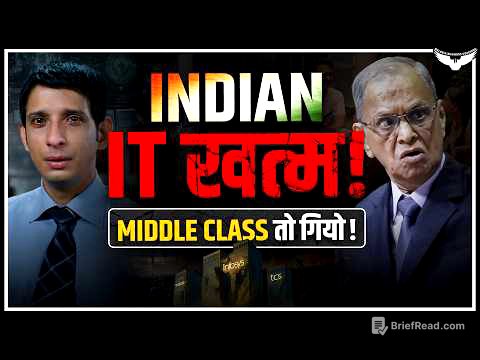TLDR;
The video explores poverty and unemployment as intertwined social issues with significant implications for individuals, families, and communities. It examines the structural inequalities that perpetuate these challenges, their impact on individuals and society, and highlights the need for comprehensive solutions. The video defines poverty and unemployment, discusses the cycle of poverty and social exclusion, and provides real-world examples such as global poverty, youth unemployment, structural unemployment, and the working poor. It concludes by emphasizing the importance of sociological understanding and collective efforts to address these issues through policy, education, and social support.
- Poverty and unemployment are intertwined social issues rooted in structural inequalities.
- These issues lead to social exclusion, health disparities, and economic strain.
- Addressing poverty and unemployment requires comprehensive solutions involving policy makers, businesses, and communities.
Introduction to Poverty and Unemployment [0:04]
Poverty and unemployment are presented as deeply connected social issues that significantly affect individuals, families, and communities. Understanding these issues sociologically provides insights into structural inequalities and power dynamics that perpetuate these challenges. The discussion includes the causes and consequences of poverty and unemployment, their impact on individuals and society, and real-life examples that underscore the need for comprehensive solutions to address these systemic problems.
Understanding Poverty and Unemployment as Social Issues [0:43]
Poverty is defined as the lack of sufficient income, resources, and access to basic necessities for a decent standard of living. Unemployment occurs when individuals willing and able to work cannot find suitable employment. Sociological research indicates that poverty and unemployment are rooted in structural inequalities, such as unequal access to education, healthcare, and job opportunities based on factors like race, gender, and socioeconomic status.
Cycle of Poverty and Social Exclusion [1:19]
Poverty and unemployment often create a cycle of disadvantage, where individuals from low-income backgrounds face barriers in accessing quality education and stable employment, perpetuating generational poverty. This can lead to social exclusion and marginalization, as individuals have limited opportunities for participation in society and access to resources.
Impact of Poverty and Unemployment on Individuals and Society [1:44]
Poverty and unemployment can lead to feelings of hopelessness, stress, and anxiety, affecting the mental health and well-being of individuals and their families. Individuals facing poverty often experience health disparities due to limited access to healthcare and nutrition, contributing to higher rates of chronic illnesses. Widespread poverty and unemployment place a strain on the economy by reducing consumer spending and hampering overall economic growth. High levels of poverty and unemployment can lead to social unrest and a breakdown of social cohesion, as individuals may feel disillusioned and alienated from society.
Examples of Poverty and Unemployment as Social Issues [2:27]
Global poverty affects millions worldwide, particularly in developing countries where individuals lack access to basic necessities such as food, clean water, and healthcare. Youth unemployment rates are disproportionately higher in many countries, leading to concerns about the long-term economic prospects of young people. Structural unemployment occurs when available jobs do not match the skills or qualifications of the unemployed workforce, leading to a persistent lack of employment opportunities. The working poor are individuals or families who are employed but earn wages insufficient to lift them above the poverty line, highlighting the issue of low-wage jobs and income inequality.
Conclusion [3:17]
Poverty and unemployment are complex social issues with far-reaching implications for individuals and society. Understanding the root causes, impact, and interplay of these challenges is essential for developing effective interventions and policies. Sociologists play a vital role in studying structural inequalities, analyzing social policies, and advocating for solutions that promote economic opportunity and social inclusion. Addressing poverty and unemployment requires a comprehensive approach involving policymakers, businesses, and community organizations. Providing access to quality education, job training programs, and supportive social safety nets are crucial steps in breaking the cycle of poverty and creating opportunities for economic empowerment and social mobility. Collective efforts are necessary to combat poverty and unemployment and work towards building a more just and equitable society for all.









